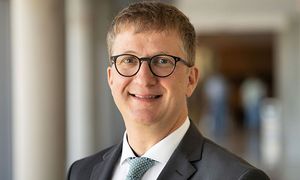
The Department of Psychiatry, Psychosomatics, and Psychotherapy (PPP) of University Hospital Würzburg, as a provider of maximum care, covers the entire spectrum of mental disorders and therapeutic options. Every year, around 3,000 people with psychiatric illnesses or in mental crises receive support and treatment on seven specialized wards, in three day-care centers and in eight specilized outpatient clinics.
Comprehensive and personal care
In addition to competent diagnostics, professional advice, and therapeutic support based on established guidelines, our focus lies on personal Treatment and care of the individual considering his or her particular needs. The highly qualified staff of more than 100 healthcare specialists, ranging from doctors and psychologists, music and art therapists, occupational therapists, to social educational specialists, as well as the motivated and specialized nursing staff allow for individually tailored treatment and care at the highest level.
Closely interconnected in all directions
Integrated into the Center of Mental Health, we are closely networked with other disciplines of the University Hospital, such as the Comprehensive Heart Failure Center (CHFC), the Center for Rare Diseases (ZESE), the Departments of Gynecology and Obstetrics, Neurology and Internal Medicine II. In addition, we work closely with many state and private institutions, self-help groups and relatives' organizations. We are involved in numerous initiatives that contribute to raising awareness and prevention of mental illness.
Excellent research
Therapeutic options can only improve if scientific research delivers new insights. In numerous research projects, often in national and international networks, we contribute decisively to finding answers to address the development or prevention of mental illness and to breaking new ground in diagnostics or therapy.
Interdisciplinary and thorough teaching and training
In the field of teaching, we offer numerous seminars, practical courses, and lectures for students of medicine, psychology, biology, law, and social pedagogy. Furthermore, we ensure the future care in the specialties in this field by providing thorough professional education and training for all career groups in a psychiatric clinic, as well as further education and training for psychiatrists and general practitioners.
With this wealth of knowledge and experience, we provide a framework from which re-orientation, anxiety reduction, and the healing of mental illnesses becomes possible.
Department Management
Prof. Dr. med.
Sebastian Walther M.D.
Head of the Department of Psychiatry, Psychosomatics and Psychotherapy
+49 931 201-77000
Contact
Appointment
Policlinic
Phone: + 49 931 201-77800
E-Mail: ep_poli@ukw.de
In-patient care
Phone: +49 931 201-76050
E-Mail: ep_poli@ukw.de
Clinic directorate
Prof. Dr. med. Sebastian Walther
Secretary´s office
Phone: +49 931 201-77010
Fax: : +49 931 201-77020
E-Mail: ps_sekr@ukw.de
Address
Klinik und Poliklinik für Psychiatrie, Psychosomatik und Psychotherapie des Universitätsklinikums | Margarete-Höppel-Platz 1 | 97080 Würzburg | Deutschland



